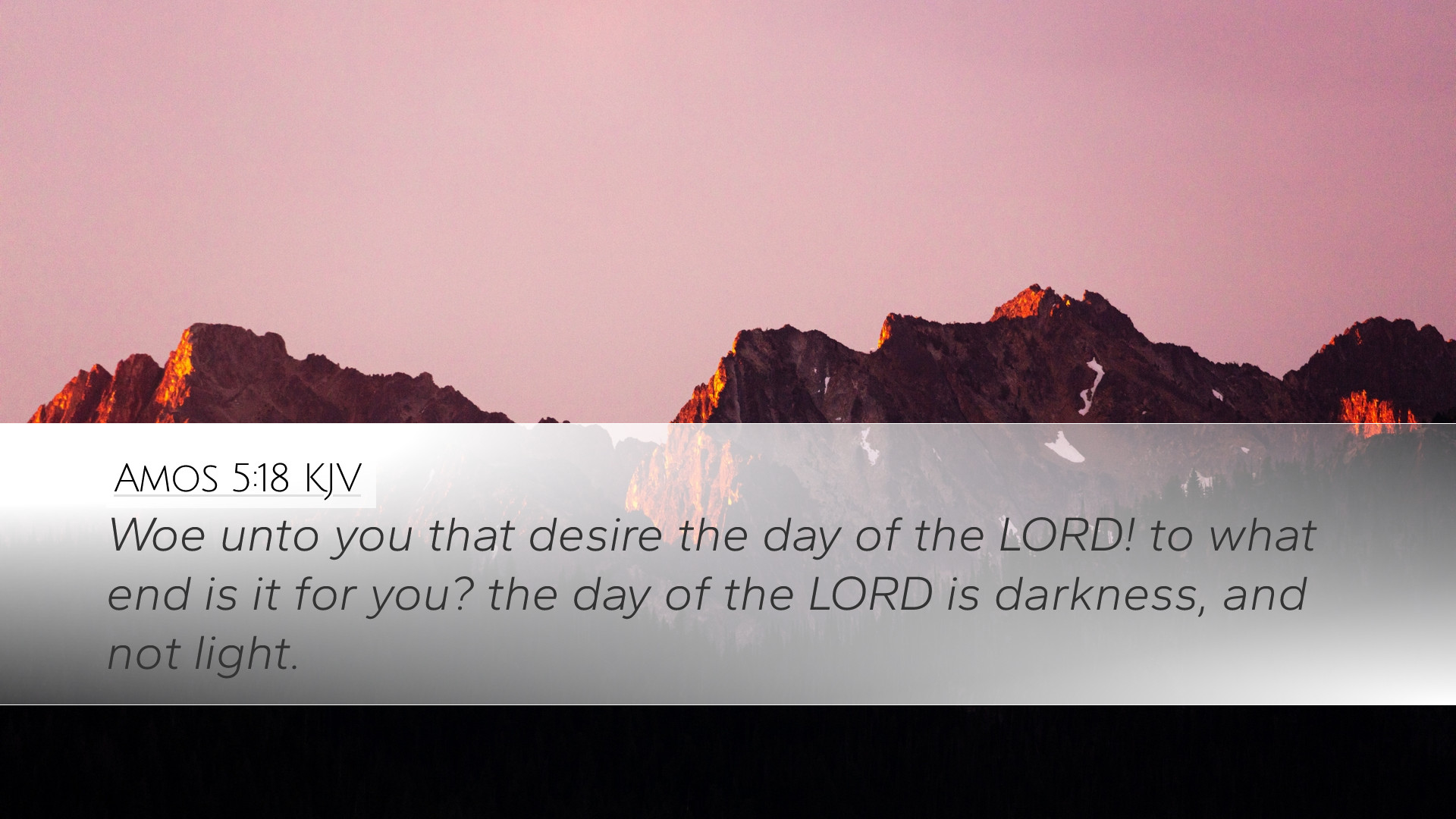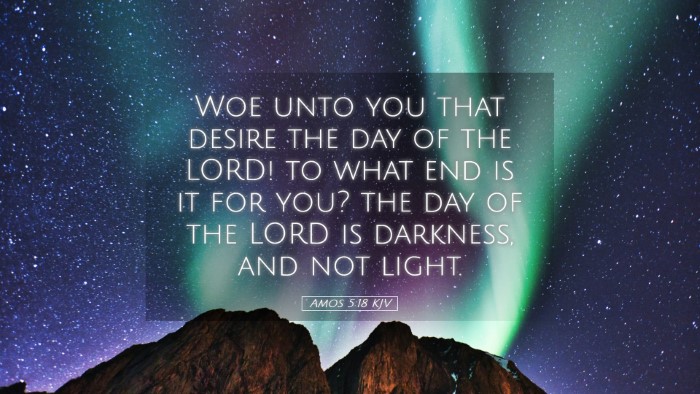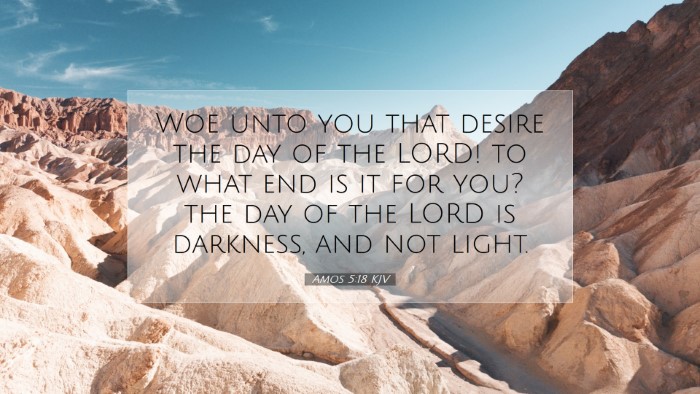Old Testament
Genesis Exodus Leviticus Numbers Deuteronomy Joshua Judges Ruth 1 Samuel 2 Samuel 1 Kings 2 Kings 1 Chronicles 2 Chronicles Ezra Nehemiah Esther Job Psalms Proverbs Ecclesiastes Song of Solomon Isaiah Jeremiah Lamentations Ezekiel Daniel Hosea Joel Amos Obadiah Jonah Micah Nahum Habakkuk Zephaniah Haggai Zechariah MalachiAmos 5:18
Amos 5:18 KJV
Woe unto you that desire the day of the LORD! to what end is it for you? the day of the LORD is darkness, and not light.
Amos 5:18 Bible Commentary
Amos 5:18 Commentary
Verse: "Woe to you who long for the day of the LORD! Why do you long for the day of the LORD? That day will be darkness, not light." (Amos 5:18, NIV)
Introduction
The Book of Amos serves as one of the profound prophetic voices in the Old Testament, addressing issues of social justice, true worship, and the day of the Lord. Amos 5:18 serves as a critical warning against a misplaced longing for the day of the Lord. This commentary will delve into the insights from public domain commentaries by notable scholars to provide a comprehensive understanding of this verse.
Contextual Background
Amos prophesied during a time of prosperity in Israel, particularly under the reign of King Jeroboam II. However, this prosperity was accompanied by widespread corruption, idolatry, and neglect of the poor. The prophet's message emphasizes the stark contrast between Israel's desires for divine favor and the actual state of moral decay. The phrase "day of the Lord" often evokes images of hope and restoration, yet in Amos, it operates as a motif of impending judgment.
Insights from Matthew Henry
- Warning Against Misplaced Expectation: Henry underscores that the people’s yearning for the day of the Lord reflects a fundamental misunderstanding of God’s nature. They expected it to be a day of triumph and vindication, failing to recognize it would instead bring judgment upon their unrepentant hearts.
- The Dual Nature of the Day: He highlights that while the "day of the Lord" can signal blessing for the righteous, it will spell disaster for those who live in sin. This calls for a self-examination of one's standing before God.
- Call for Genuine Repentance: Henry notes that the true perspective on such a day should lead to a desire for repentance rather than a desire for mere deliverance or solace in ease. It is an exhortation to align one’s life with God’s holiness.
Insights from Albert Barnes
- The Nature of Destruction: Barnes elaborates that the “darkness” mentioned in the verse symbolizes not simply physical darkness but also spiritual barrenness. The imagery serves to communicate the depth of calamity awaiting those unprepared for God’s judgment.
- Critique of False Security: He points out that the Israelites felt secure in their religion and rituals, which blindsided them to the seriousness of their moral failures. Barnes emphasizes the futility of ritualistic worship when the heart is far from God.
- Doctrine of Accountability: This commentary urges an awareness that simply desiring to see the divine intervention is not sufficient. Each person holds personal accountability for their actions and their relationship with God.
Insights from Adam Clarke
- Understanding the Prophetic Tone: Clarke emphasizes Amos' passionate plea as a reflection of the divine burden upon him. The prophet is not just making a statement but is genuinely concerned about the fate of his people.
- Analyzing the Concept of 'Woe': Clarke elaborates on the word “woe” indicating profound grief or lamentation. It signals impending doom and warns that the anticipated day of the Lord will, instead of delivering them, bring sorrow and calamity due to their unfaithfulness.
- Contrast of Expectations: He also notes the irony that while they long for the day of the Lord, it would lead to judgment rather than salvation. Clarke highlights how spiritual complacency can lead to a gross miscalculation regarding God’s coming judgments.
Theological Implications
The verse challenges contemporary readers—including pastors, students, and theologians—to reconsider their own attitudes toward divine intervention and judgment. There are significant implications for understanding God's holiness, justice, and the nature of repentance.
- God's Holiness: One key takeaway is the understanding that God’s holiness necessitates judgment against sin. The true day of the Lord serves both as a warning and an invitation to holiness.
- The Nature of True Worship: This text requires believers to evaluate if their worship practices reflect genuine devotion or if they reside in mere ritual. True worship is drawn from sincere hearts aligned with God's will.
- Personal Accountability: It prompts readers to take personal responsibility for their relationship with God. Questions of how one lives, the authenticity of faith, and genuine repentance come to the fore.
Conclusion
Amos 5:18 serves as a cautionary message to all who might be lulled into a false sense of security regarding their relationship with God. The insights from Matthew Henry, Albert Barnes, and Adam Clarke enrich our understanding of this profound text. They underscore the importance of true repentance, understanding God's judgment, and living in alignment with His will. Pastors, students, theologians, and scholars are encouraged to reflect deeply on this passage, ensuring that their yearning for divine intervention is met with a life that genuinely seeks after God’s holiness.


